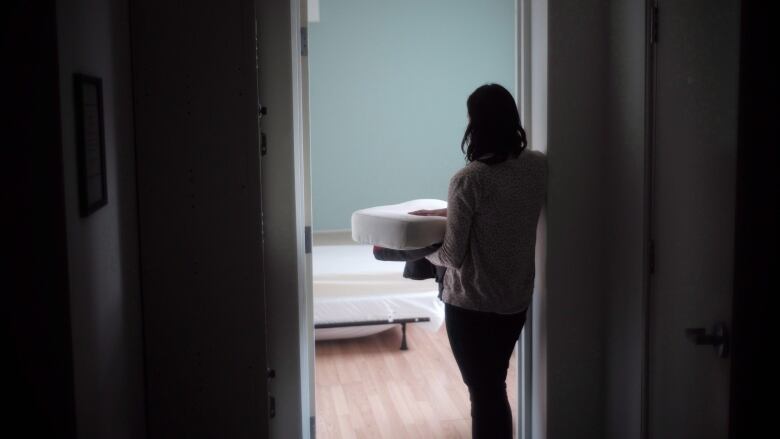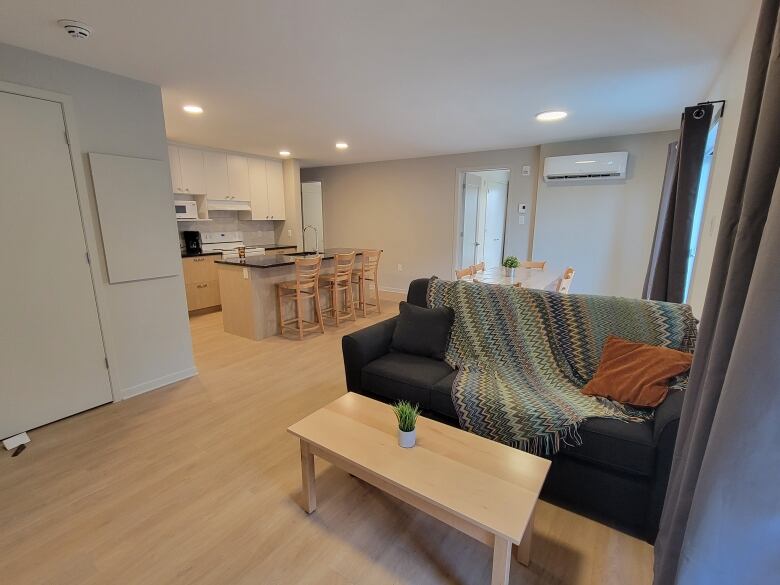Bureaucracy is holding up critical women's shelter spaces, groups say
Organizations say 11 projects stalled, want government to streamline process

As many as200 future women's shelter spaces in Quebec are under threat because they're subject toregulations made for completely different situations, a coalition of domestic violence prevention groups warned on Tuesday.
The groups Alliance MH2, theRegroupement des maisons pour femmes victimes de violence conjugaleandSOS violence conjugale say requests for help from victims of domestic violence are"reaching historic peaks," while their projects to expand second-stage shelter capacity languish in financial limbo in spite of already-allocated government funds.
They want the various provincial ministries, secretariats and agencies implicated in the Quebec government's domestic violence strategy to quickly streamline the process.
"The financial situation is critical right now," said Maud Pontel, the general co-ordinator of Alliance MH2, which represents 38 second-stage shelters across Quebec. Pontel said shelters can't keep bearing the costs ofprojects while waiting for funding issues to be resolved.
"We need the government to understand that they have to act fast."

Second-stage shelters are post-emergency transitional accommodations for people who have fled violent domestic situations. The groups say 11 projects in five regions in Quebec are currently held up, accounting for 200 spaces.
The funding itself exists: the creation of more second-stage shelter spaces was among the priorities when the Quebec government topped up funding to fight intimate partner violence in April 2021, partly in reaction to a troubling rise inkillings of women.
But the groups say new facilities are subject to Quebec's rules governing social housing, andthose rules don't allow spaces such as group meeting rooms and facilities for children. Andthey say Quebec's Health Ministry doesn't provide funds for construction or real estate considerations like mortgages.
At this point, they say$22 million of planned spaces have been held up.
'Construction hasn't started yet'
"One shelter in Montreal was supposed to open their doors a year ago," Pontel said."They were supposed to offer services for 14 families, around 40 people. Right now they still can't give those services because the delays are so bad the construction hasn't started yet."
In a statement sent to CBCNews, the Housing Ministry said it understands that second-stage shelters are not the same as social housing and thattheSocit d'habitation du Qubecmeets with the Alliance MH2every two weeks "in order to resolve hindrances to projects in development."
The government says that 746 spaces for victims of domestic violence have been built or are being built since October 2018.
The groups acknowledge "certain progress" in their conversations with government,but they say the meetings address a single project at a time. And they say consequences of demand for shelter space exceeding supply are clear.
"When we have to say no to a woman who needs to come into the shelter because there's no places, it's always a hard decision to make,"said Louise Riendeau, spokesperson forRegroupement des maisons pour femmes victimes de violence conjugale.
"Front-line workers are very anxious when they have to say there isn't a place."
with files from John Ngala












_(720p).jpg)


 OFFICIAL HD MUSIC VIDEO.jpg)
.jpg)



























































































